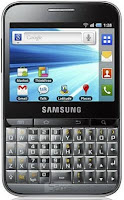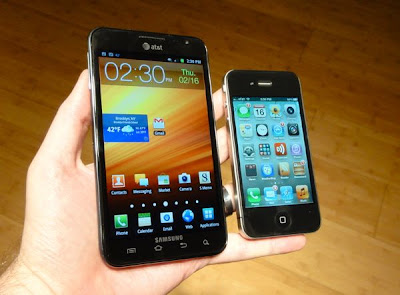Are you confused
to choose between iPhone and Android? Well, there's more to the decision than
just flipping a coin.
My advice?
Not a new iPhone or Android smartphone until you get answer six crucial
questions for yourself, they are as follows:
1. Do smartphones scare you?
Afraid
you’ll break something if you tap one of the little icons on the screen?
If this
happens, think twice about Android. Personally, I'm a sucker for all settings
and customization options on an Android phone, but the thicket of menus and
submenus can feel daunting for beginners, or anyone easily frustrated by
telephone interfaces difficult.
The iPhone,
on the other hand, has a clean and simple interface that is perfect for novice
smartphone, while dropping the extra "menu" and "Back"
buttons that make navigating the interface a standard Android such a chore.
2. Do you want a physical QWERTY keypad?
Tapping out
long messages on a virtual keyboard can be royal pain if you have clumsy
fingers, and even those with nimble fingers can feel the real keys prefer a
smooth glass touch screen.

So if a
physical QWERTY keyboard is a must, go with Android. Various brands and models
of Android phones with large, full-on keypads are available. In some cases,
keyboards extend behind the touch-screen, while other is located on the front
side of the device just below the screen.
Apple,
however, shows no signs of making an iPhone with a physical keyboard and while
it is possible to create a wireless Bluetooth keyboard to connect to say, the
iPhone 4S, you would also keyboard accessory bag where you go too.
3. Do you depend on Gmail and Google Calendar?
One of the
beauties of Android is that the initial installation process is a piece of
cake-for Google users in any case.
If you have
a Google account, your new Android phone from the box, power it on, sign in
with your Google ID and password, and presto! All of your Gmail messages,
mailboxes, Google contacts and calendars begin synchronizing your handset
automatically. It's a beautiful thing.
Dedicated
Google users to go with the iPhone will not be too difficult a time setting up
their Gmail or diaries, dealing with Google contacts is another story, however.
A second service called Google Sync will help keep all your Google contacts
sync with the iPhone address book, but this set is a fairly lengthy, difficult
process.
4. Do you use a Mac?
Just like
Gmail and Google Calendar users an easy transition to an Android phone, that
Mac users will slide right into an iPhone-especially if you store your contacts
in the Mac OS X Address Book and iCal for your calendar.
The desktop
iTunes software will quickly synchronize your Address Book contacts and iCal
calendars to a new iPhone (along with all your apps and music, of course),
while Apple's new icloud service (in conjunction with iOS 5, the latest version
the iPhone's system software) will coordinate all of your desktop and iPhone
contacts and events wireless, no cables needed.
5. Want to play Flash videos?
Ever visit a
website on a smartphone, but a blank screen on the page "Adobe Flash
plug-in required" reading?
That's
because some of the greatest sites on the web are dependent on a technology
called "Flash" for viewing videos and nice graphical menus and
without flash, those sites are not functioning properly.
The newest
Android phones do support Flash content, which means that virtually any site on
the web should be completely displayed.
That is not
the case with the iPhone, though. Indeed, Apple has been openly critical of
Flash technology (the late Steve Jobs once called it a battery hog, a slow-sack
and a safety problem) and is essentially explained both the iPhone and iPad are
flash-free zones.
Keep in
mind, however, that more and more Flash-heavy websites offer alternative
versions tailored for non-Flash smartphones like the iPhone-a development that
may eventually lead to the mobile Flash support is a moot point.
6. Are you an app addict?
While
Android is one of the most vibrant communities of app makers around, Apple's
App Store is the undisputed king of mobile applications. The shelves are filled
with 500,000 apps and counting (compared to a still very healthy 350,000 or so
for Google's Android Market), and the most interesting and exciting
applications and tend to build for the iPhone first.



No comments:
Post a Comment